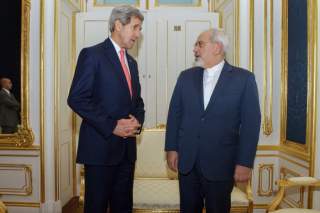Sorry, America: Iran Won't Defeat ISIS for You
"While Washington and Tehran may share a few common interests in weakening ISIS, Tehran is seeking to both push the United States out of the region and to curtail the influence of Saudi Arabia and the Gulf States."
ISIS’s persistence has led some analysts to conclude—most recently Harvard’s Stephen Walt—that ISIS’s “state” will be a long-term reality in the region and one that Washington may soon have to come to terms with. From developing its own currency to managing a system of governance and terror wrapped in ideological fervidity, the Islamic State certainly has shown its resilience, despite its morphing geography since it captured Mosul in the summer of 2014.
Since the finalizing of the Iranian nuclear agreement, Iran has been touted in Washington in some policy circles as the best partner in fighting ISIS. Potential common interests between Washington and Tehran—as well as Iran’s military capabilities—could make Tehran an effective ally in rolling back ISIS at a time when the United States is wary to commit to another ground war in the Middle East. This assessment has three substantial blind spots:
First, Tehran’s strategy in Syria and Iraq has been focused more on containing and managing ISIS than defeating it. This strategy is driven by different considerations in both countries. In Syria, ISIS is seen as an effective tool in both weakening the U.S.- and GCC-backed opposition militias and buttressing the argument that President Assad is a most amenable alternative in Syria. Iraq, on the other hand, presents a difficult balancing act for Tehran that consists of both managing ISIS as a security threat to Iran’s heartland and Iraq’s Shi’a communities and avoiding empowering Sunni communities to such a degree that they could later pose a credible challenge to Iran’s influence in the Iraqi state. Tehran will prefer to keep Iraq unstable until its dominant influence is assured. Iran has been less than effective in pursuing this strategy as evidenced by its recent poor performance in Al Anbar Province and its difficult recapture of Tikrit in the spring.
Second, the best partners in defeating ISIS are Sunni Arab states and communities. ISIS’s resilience in the region has been sustained both by the effective use of military tactics and organizational strategy, but also, by a deepening ideological resonance amongst disenfranchised Sunnis in communities worldwide from Afghanistan to the banlieues of Paris. Without a sustained buy-in from leading Sunni states on both the governmental level and on the civil-society level to counter ISIS’s ideology, the Islamic State will continue to be a feature in the region’s body politic. As a senior Gulf official once noted, the responsibility of defeating ISIS isn’t an American or Iranian responsibility, but the responsibility of the Muslim community worldwide to reject this violence.
Third, Iran’s endgames in Iraq and Syria are in complete contrast to the United States’ objectives. While Washington and Tehran may share a few common interests in weakening ISIS, Tehran is seeking to both push the United States out of the region and to curtail the influence of Saudi Arabia and the Gulf States. A political solution in Syria or Iraq, which gives the United States and the GCC a further foothold in these states, would be an outcome that Iran would vigorously oppose.
Washington policymakers should be wary, then, of embracing Iran as such a partner as it considers recalibrating U.S. strategy in countering ISIS.
Image: Flickr/usembvienna

